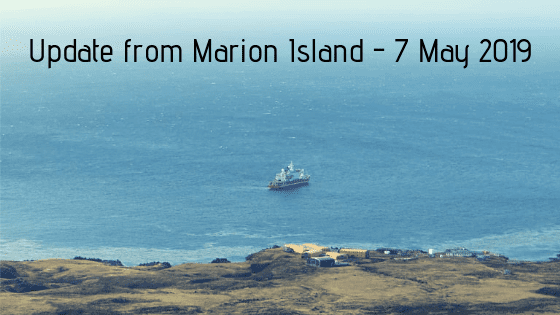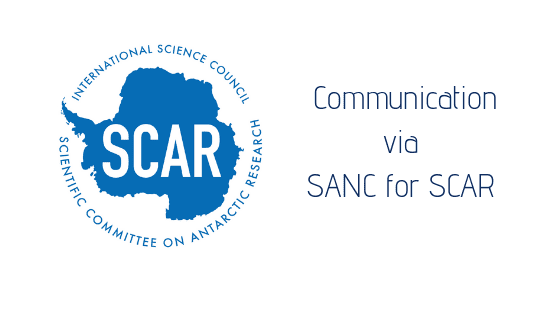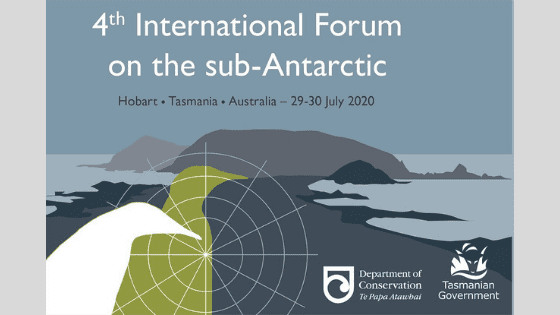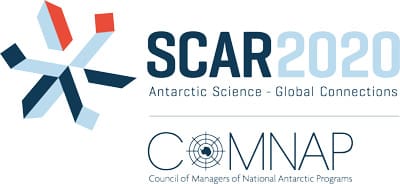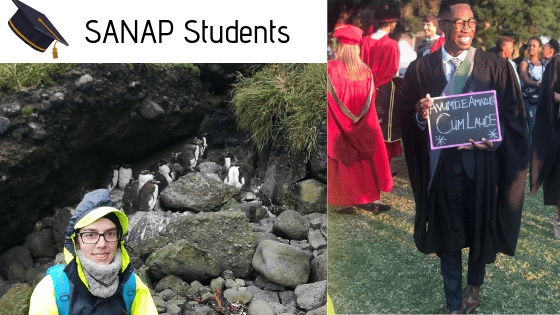
by Fishgate@sanap | May 7, 2019 | Announcement, Important Dates, News, SA Agulhas II
Time on the island is rapidly running out for all passengers returning to Cape Town, this includes everyone except the 76th Marion Island Overwintering Team. The take-over scientists are wrapping up field work and packing containers for back-loading started at this research station.
The first containers were transported to the research and supply vessel, S.A. Agulhas II. Watch the video below to see how a container is transported by helicopter.
These last few days are bitter sweet on the island. The 75th overwintering team returning to Cape Town have to say goodbye to the place they called home for 13 months. A place that was at first maybe something to get used to, and now a very special memory that will last a lifetime. For many this might be the last time they get to visit this pristine island in the Southern Ocean, but for the 76th overwintering team the departure of the vessel is something to look forward to, as they will be able to unpack their personals in their own rooms and settling in, preparing for the year ahead.
The vessel is expected to depart from Marion Island on the 9th of May and the expected time of arrival at East Pier, Cape Town Harbour, is 16 May 2019. The longer return voyage will be used toward oceanographic research on transects between the Prince Edward Islands and Cape Town.
Bon Voyage, see you soon!
https://www.facebook.com/UltimateAviationsa/videos/408739073050873/
Photo Credit: Daniela Monsanto (PhD Candidate, University of Johannesburg)
Video Credit: Ultimate Aviation Group
Anché Louw, Antarctic Legacy of South Africa, 07 May 2019

by Fishgate@sanap | May 3, 2019 | News
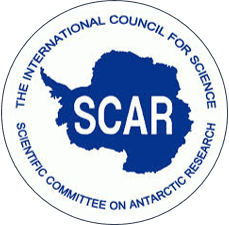
Communication via the South Africa National Committee for SCAR Chair – Professor Bettine van Vuuren.
Dear SANAP community,
Below an email from the SCAR Secretariat – It was decided that the SCAR structures be reviewed (at the meeting in Davos, 2018), and following from that, a survey was put together.
We have a real chance to contribute, and to drive change here; change that will work for us. I am the first one to sigh when asked to fill in (yet another) survey, but we really can make a meaningful contribution here. Please find the time in your busy schedules to complete this survey, and please pass this message on.
Remember, the entire SCAR Programme Structure will change in 2020, most meaningfully in terms of the big Science Programmes. Your input here can make a big difference, and if enough of us take the time to complete it, we can make sure that our work and our needs are more fully met by SCAR.
Please look at the email below from the SCAR Secretariat
Dear SCAR Group Leaders,
At the 2018 SCAR Delegates meeting, the Delegates asked the Executive Committee to review SCAR programmes, activities and committees to ensure they continue to be fit-for-purpose as the science need evolves.
To help with this task, the SCAR Executive Committee are conducting a survey of SCAR’s members, scientists, partners and groups that use SCAR data and findings. With the survey we are asking for input on how different stakeholders engage with SCAR programmes and activities and what they expect from SCAR.
You are invited to complete the survey. SCAR would like participation to be as wide as possible, so you are welcome to share the link with colleagues in their institutions, countries, and with international collaborators who benefit from SCAR.
The survey should take between 15 and 30 minutes depending on the level of feedback you provide.
The survey is available at the following link(here) and will be open until Friday May 31st:
Thank you in advance. If you have any questions, please email info@scar.org
SCAR Secretariat
Haven’t met the South African National Committee (SANC) for SCAR yet (click here).

by Fishgate@sanap | May 3, 2019 | Announcement, Important Dates, SANAP, Southern Ocean, sub-Antarctic

Date: 29 – 30 July 2020
“Come and discuss the challenges facing the sub-Antarctic in a changing world and share ideas for the future”.
Sessions include:
- climate
- conservation
- biosecurity
- geoscience
- tourism
- fishing
- heritage
- connectivity
- management challenges.
Website: Click here.
Follow subant2020 on Twitter!

by Fishgate@sanap | May 2, 2019 | Announcement, Important Dates, News
The information below was sent through by the Scientific Committee on Antarctic Research Secretariat. .

Preparations are well underway for the 2020 SCAR meetings and Open Science Conference to be held in Hobart, Australia in July-August 2020. The COMNAP Annual General Meeting will run concurrently with SCAR and the organisers are working to schedule events to encourage participation across the two groups. The OSC theme ‘Antarctic Science: Global Connections’ highlights the scientific connections between Antarctica and the global system and collaboration in our Antarctic science community.
The Local Organising Committee are working closely with the SCAR and COMNAP Secretariats on meeting preparations including an excellent program of conference and side events. Planning for SCAR COMNAP 2020 includes efforts to minimise waste, encourage sustainable resource management and to foster participation inclusion and diversity.
The first pre-conference circular is now available and outlines some key pieces of information about SCAR COMNAP 2020. This includes the conference structure and indicative dates for abstract submission and registration.
The International Science Organising Committee has also developed a draft list of sessions based on input from the SCAR community – it is available for comment on the SCAR COMNAP 2020 website. Comments, suggested changes, proposals for additional sessions and suggestions for sessions to be merged together should be made to info@scar.org by 28 June 2019.
For more information, please check the SCAR COMNAP 2020 website or contact the SCAR COMNAP 2020 Project Manager, Rhonda Bartley at the Australian Antarctic Division – email: SCARCOMNAP2020@aad.gov.au
We look forward to seeing you all in Hobart next year!
Kind regards,
The SCAR Secretariat

by Fishgate@sanap | Apr 30, 2019 | Announcement, News, Science
Congratulations to Daniela Monsanto and Mthoko Twala, two SANAP students completing their Masters degrees, both with cum laude, within the field of biology.
Daniela completed her degree at the University of Johannesburg, under the supervision of Prof Bettine van Vuuren. This Masters was part of the SANAP project: Biocomplexity: Understanding biological patterns in space and time. Daniela examined fine-scale spatial genetic patterns in one of the most dominant and ecologically significant soil organisms across the sub-Antarctic region, the Collembola Cryptopygus antarcticus. Her work highlighted a genetic discontinuity, which when overlaid onto a detailed geomorphological map of the area, coincided with a 3 meter ridge (for Collembola, this height is equivalent to a human scaled to 2.5 times the height of Table Mountain).
Mthoko completed his degree at the University of Pretoria, under the supervision of Dr Michelle Greve. This Masters was part of the SANAP project: Invasions in the changing sub-Antarctic. Mthoko assessed whether the invasive plant, Sagina procumbens, disproportionately benefits other invasive species on Marion Island. He found mixed results, with invasive plants necessarily benefitted from Sagina, but invasive collembolans benefitting more than native collembolans.
Congratulations to the students, as well as the supervisors.
See below these achievements announced on social media.
https://www.facebook.com/AntarcticLegacySA/posts/853552648317012
https://www.facebook.com/AntarcticLegacySA/posts/854122318260045
Anché Louw, Antarctic Legacy of South Africa, 30 April 2019
